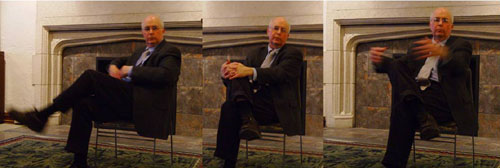
The President’s Council on Bioethics is under no obligation to seek a consensus on bioethics issues, said a member of the council, speaking in Madison Friday evening. Gilbert Mailaender, the Duesenberg Professor of Christian Ethics at Valparaiso University, does believe that the council is having an impact.
The council meets every other month and has issued about nine reports on various bioethics issues. Mailaender says he can’t point to any particular piece of legislation that the body has influenced but he believes the council’s reports have enriched the dialogue over bioethics issues. "Policy should not be made by a body like ours," he said. "that’s why we have legislators."
Mailaender says he is currently the only one on the 18-member council with theological training. There are a variety of perspectives on the council: scientific, educational, and philosophical. The council was formed in August of 2001, at the same time that President Bush announced his opposition to federal funding of embryonic stem cell research. Mailaender noted that new research by UW-Madison professor James Thomson and others has now found an alternative source of stem cells from ordinary human skin cells, without the need to destroy human embryos. "I think the president’s policy gets some of the credit for that discovery," Mailaender said, noting that without opposition researchers may not have been as actively looking for alternative procedures.
In the question and answer session following his remarks to a gathering of about 30 faculty members, organized by InterVarsity Graduate and Faculty Ministry, Mailaender observed that there are a variety of concepts on human dignity in our society, but not as coherent as they used to be. "Our concept of human dignity owes a lot to the Christian roots of our civilization," he said. "We want to continue to affirm it but we’ve left behind the metaphysical support for it."
"We can affirm it pragmatically," he continued. "Whether we’ll have it in us to affirm value of these people when their capacities are lost (due to age and disease), I don’t know. Many people wish to continue to affirm it but they don’t know why."
He predicted that society will continue to confront this issue. "In the next 20 years we will argue over what degree of resources are deserved by those with dementia, and the elderly," he predicted.
Mailaender was in Madison to participate in a weekend conference on C.S. Lewis, organized by New College Madison, the Bradshaw-Knight Foundation, and several other groups, taking place today at the Pres House, 731 State Street.

